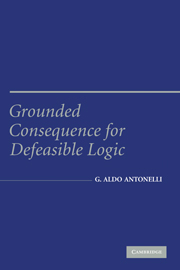1 - The Logic of Defeasible Inference
Published online by Cambridge University Press: 18 July 2009
Summary
FIRST-ORDER LOGIC
It was mentioned that first-order logic (henceforth fol) was originally developed for the representation of mathematical reasoning. Such a representation required the establishment of a high standard of rigor, meant to guarantee that the conclusion follows from the premises with absolute deductive cogency. In this respect, fol turned out to be nothing but a stunning success. The account of deductive reasoning provided by fol enjoys a number of important mathematical properties, which can also be used as a crucial benchmark for the assessment of alternative logical frameworks. (The reader interested in an introduction to the nuts and bolts of fol can consult any of the many excellent introductory texts that are available, such as Enderton, 1972.)
From the point of view of abstract consequence relations, fol provides an implementation of the so-called no-counterexample account: A sentence Φ is a consequence of a set Γ of sentences if and only if one cannot reinterpret the (nonlogical part of the) language in which Γ and Φ are formulated in such a way as to make all sentences in Γ true and Φ false. An inference from premises ψ1, …, ψk to a conclusion Φ is valid if Φ is a consequence of {ψ1,…, ψk}, i.e., if the inference has no counterexample.
- Type
- Chapter
- Information
- Grounded Consequence for Defeasible Logic , pp. 1 - 28Publisher: Cambridge University PressPrint publication year: 2005



